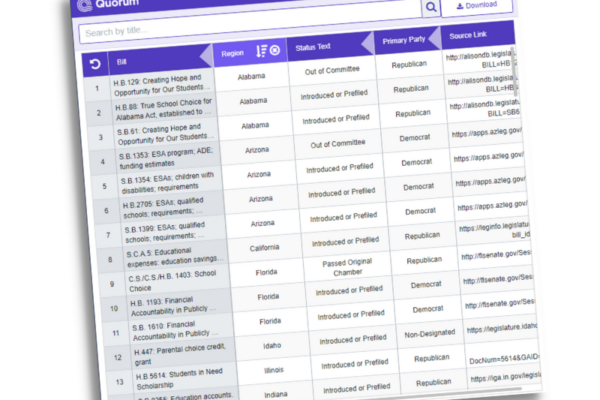Updated: 5/27/2024
As it did last year, private-school choice is looming large in 2024 state legislative sessions. Building on a flurry of 2023 choice laws, lawmakers in multiple states are working to create or expand programs directing public funds towards private educational opportunities. But the rapid expansion of school choice has also provoked some backlash in state capitols.
FutureEd has identified 118 private-school choice bills in 34 states introduced or prefiled so far in 2024. While most aim to broaden private-school choice options, a handful seek to scale back such programs. So far, 16 have been enacted, including Alabama’s CHOOSE Act (H.B. 129), which establishes an education savings account that will soon be open to all families in the state. Missouri’s S.B. 727 expands the state’s existing tax-credit scholarship ESA, raising the income limit from 200 percent of the federal free or reduced-price lunch threshold to 300 percent and increasing the funding cap from $50 million to $75 million. And in Georgia, S.B. 233 creates an ESA program for students in the lowest performing 25 percent of public schools. More bills supporting school choice are expected in the coming months, particularly in Republican-led states where choice bills failed last year or where lawmakers have yet to extend private-school-choice eligibility to all students.
Last year was a landmark year for private-school choice, with 17 states enacting legislation to either establish or expand programs. Eight of these states—Arkansas, Florida, Indiana, Iowa, North Carolina, Ohio, Oklahoma, and Utah—adopted universal or near-universal eligibility, bringing to ten the number of states with universal programs.
This year, legislators in several states aspire to join their ranks, introducing bills to launch universal private-school choice, whether gradually or all at once. Although Tennessee’s efforts to establish a universal ESA program died this year, Louisiana legislators are still considering H.B. 745, which would create the LA GATOR scholarship and open it to all the state’s children within three years. Nebraska’s L.B. 1386 proposes a modest universal ESA, providing $1500 per student per year.
Other bills target specific student groups. In Pennsylvania, for example, S.B. 1057, introduced by a Democrat and co-sponsored by a Republican, would create the Educational Freedom Act Program to offer scholarships to low-income students zoned to low-performing public schools. The bill is modeled after Governor Josh Shapiro’s school choice plan, offering scholarships up to $10,000 for high school students and $15,000 for students with special needs.
At the same time, lawmakers in other states are pushing back on established programs. In Iowa, S.F. 284 seeks to repeal the state’s universal ESA program that was established last year.
Democrats in Tennessee have introduced bills that would require the department of education to annually collect and report information for each participating private school and education provider, including the cost of tuition, admission policies and decisions, students demographics, and student performance metrics; ensure private schools receiving public funds comply with the same public school testing requirements; and mandate that participating schools comply with the state’s requirement to retain third-graders not meeting reading proficiency.
In Arizona, several bills seek to enact Governor Katie Hobbs’ proposal to increase accountability and transparency for the state’s universal ESA program, including requiring background checks, limiting “luxury” spending, mandating participating schools to report performance data, and requiring the Department of Education to estimate the program’s cost.
We will continue to monitor and update the tracker as new bills are introduced and progress through the legislative process.

